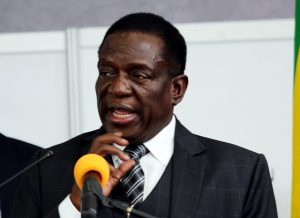


President Emmerson Mnangagwa
LOCALLY, thousands have called him a hero for toppling the only leader Zimbabwe has known for almost four decades.
Abroad, investors are, for the first time in decades, considering Zimbabwe as an investment option.
Even when the people talked, President Emmerson Mnangagwa listened because, according to him, “the voice of the people is the voice of God”.
The public said for the President to show his commitment, his old allies who have been in Cabinet for a very long time, with no clear results, have to go.
This has been done.
Mnangagwa has dropped a number of faces from the Cabinet, which has been blamed for abating Zimbabwe’s crisis through economic mismanagement.
The arrival of banker Mthuli Ncube has instilled public confidence in Mnangagwa’s commitment to turn around the economy.
However, the markets are still waiting to know if “mega deals” signed with the Chinese and other investors from across the world will materialise.
These deals will anchor Zimbabwe’s future prospects and rescue the nation, which is battling to end a blazing foreign currency and liquidity crisis.
Over 80 percent of financial transactions are now mobile due to cash crisis.
In his first State of the Nation Address (SONA), Mnangagwa said with immediate effect, his government will revisit Memorandums of Understanding (MoUs) which have not been followed through.
“In a bid to ensure that the nation realises value from its external relations, my government is, with immediate effect, revisiting all MoUs signed with other governments which are idle, gathering dust and unimplemented by various ministries,” Mnangagwa said.
On April 25, 2018, Mnangagwa announced that investment commitments to Zimbabwe clocked $11 billion.
Expectations are high.
But Mnangagwa has already demonstrated his commitment by executing structural reforms, including changes to the indigenisation and economic empowerment law.
Recently, it was announced that Zimbabwe signed a MoU with a Chinese firm for the construction of a $1 billion stainless steel plant in Midlands.
In April, it was announced that a MoU was signed with a Chinese company that will unlock $1,2 billion worth of investments into the tourism and hospitality industry. The deal was locked for three years under Robert Mugabe’s leadership.
In May, Zimbabwe and India signed a MoU for a $2,92 million grant for the supply of additional machinery for small and medium enterprises (SMEs) under the Indo-Zimbabwe project.
Mnangagwa’s government also announced that it signed a $4,2 billion platinum investment agreement with a Cyprus-based company, Karo Resources.
Also the country and Belarus signed several deals worth millions of dollars across various economic sectors, with the first agreement being a $43 million deal for the supply of agricultural equipment to Zimbabwe and the other being a $15 million deal for the supply of forestry equipment to Allied Timbers.
These are just a few deals which were signed and markets await to see if reform talk will transform into action in order to turn around Zimbabwe.
Some deals, such as the $400 million recapitalisation of the National Railways of Zimbabwe (NRZ) being undertaken by the Diaspora Infrastructure Development Group (DIDG) and Spoornet of South Africa, have paid off.
NRZ said it had registered a 13 percent increase in cargo moved during the three months ended June 30, 2018 to 856 476 tonnes after a boost from new equipment from the investment.
newsdesk@fingaz.co.zw